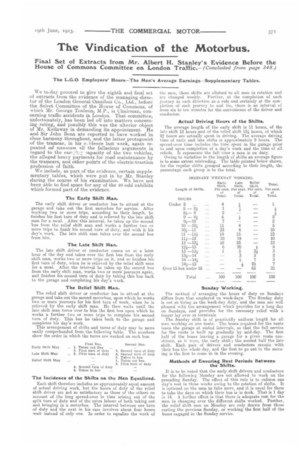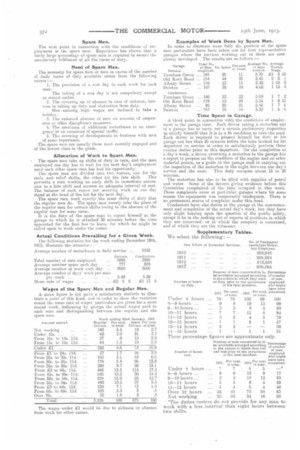The Vindication of the Motorbus.
Page 23

Page 24

If you've noticed an error in this article please click here to report it so we can fix it.
Final Set of Extracts from Mr. Albert H. Stanley's Evidence Before the House of Commons Committee on London Traffic.—(concluded from page 348.) The L.G.0 Employees' Hours—The Men's Average Earnings—Supplementary Tables.
We to-day proceed to give the eighth and final set of extracts from the evidence of the managing director of the London General Omnibus Co., Ltd., before the Select Committee of the House of Commons, of which Mr. George 'foul-min, M.P., is Chairman, concerning traffic accidents in London. That committee, unfortunately, has been led off into matters concerning rating, and possibly this was the ulterior object of Mr. Kella,way in demanding its appointment. He and Sir John Bean are reported to have worked in close harmony throughout, and the latter protagonist of the tramcar, in his e.idence last week, again repeated ad nauseam 911 the fallacious arguments is regard to the canv.i... 1-apacity of the two vehicles, the alleged heavy payments for road maintenance by the tramcars, and other points of the electric-traction profession of faith.
We include, as part of the evidence, certain supplementary tables, which were put in by Mr. Stanley ,during the course of his examination. We have not been able to find space for any of the 40 odd exhibits which formed part of the evidence.
The Early Shift Man.
The early shift driver or conductor has to attend at the garage anct take out the first motorbus for service. After working two or more trips, according to their length, he finishes his first turn of duty and is relieved by the late shift man for a meal. After this interval, he takes up the second bus from the relief shift man and works a further two or more trips to finish his second turn of duty, and with it his -day's work. The late shift man takes over the second bus from him.
The Late Shift Man.
The late shift driver or conductor comes on at a later hour of the day and takes over the first bus from the early shift man, works two or more trips on it, and so finishes his first turn of duty, when he is relieved by the relief shift man for a meal. After the interval he takes up the second bus from the early shift man, works two or more' journeys again, and finishes his second turn of duty by taking this bus back to the garage and completing his day's work.
The Relief Shift Man.
The relief shift driver or conductor has to attend at the garage and take out the second motorbus, upon which ho works two or more journeys for his first turn of work, when he is relieved by the early shift man. Ho then waits until the late shift man turns over to him the first bus upon which he works a further two or more trips to complete his second
turn of duty. This bus he takes back to the garage and completes his day's work.
This arrangement of shifts and turns of duty may be more easily comprehended from the following table. The numbers show the order in which the turns are worked on each bus.
The Incidence of the Shifts on the Men Equalized.
Each shift therefore includes an approximately equal amount of actu.al driving work, but the hours of duty a the relief shift driver are not so satisfactory as those of the others on account of the long spread-over in time arising out of the split turn of duty and of the extra labour of both taking out and bringing in a motorbus. The interval between one turn of duty and the next in his case involves about four hours wait instead of only one. In order to equalize the work of
the men, these shifts are allotted to all men in rotation and are changed weekly. Further, at the completion of each journey in each direction as a rule and certainly at the completion of each journey to and fro, there is an interval of from six to ten minntes for the convenience of the driver and conductor.
Actual Driving Hours of the Shifts.
The average length of the early shift is 11 hours, of the late shift 12 hours and of the relief shift 15 hours, of which 9,1 hours are actually spent in driving. The average driving time of early and late shifts is approximately 9 hours. The spread-over lime includes the time spent in the garage prior to and upon completion of a day's work and the time of all reliefs. It represents the full time a man is on duty.
Owing to variation in the length of shifts an average figure is to some extent misleading. The table printed below shows, for the regular shifts grouped according to their length, the percentage each group is to the total.
Sunday Working.
The method of arranging the hours of duty on Sundays differs from that employed on week-days. The Sunday duty is not se tiring as the week-day duty, and the men are well pleased with the arrangement which provides for a long day on Sundays, and provides for the necessary relief with a longer lay over at terminals The Sunday shift is of practically uniform length for all men working on one route. The buses required for the route leave the garage at stated intervals, so that the fall service for the route is built up gradually by mid-day. The first half of the buses leaving a garage for a given route constitute, as it were, the early shift; the second half the late shift. Each pair of drivers and conductors remain 'with their bus the whole day, and the first to go out in the morning is the first to come in in the evening.
Methods of Ensuring Rest Periods Between the Shifts.
It is to be noted that the early shift drivers and conductors for the following Monday are not allowed to work on the preceding Sunday. The effect of this rule is to enforce one day's rest in three weeks owing to the rotation of shifts. It is optional on the men to take more, and it is usual for them to take the days on which their bus is in dock. That is 1 day in 14. A further effect is that there is adequate rest for the men in changing over the different shifts worked. Further, the relief shift men on Monday are only drawn from those resting the previous Sunday, or working the first half of the buses engaged in the Sunday service. Spare Men.
The next point in connection with the conditions of employment is the spare men. Experience has shown that a fairly large percentage of spare men is required to secure the satn,factory fulfilment of all the turns of duty.
Need of Spare Men.
The necessity for spare men or men in excess of the number of daily turns of duty available arises from the following causes ; 1. The provision of a rest day in each week for each man.
The taking of a rest day is not compulsory except as stated earlier.
2. The covering tip of abseuce in case of sickness, lateness in taking up duty and abstention from duty. Men earning high wages are inclined to take a holiday.
3. The enforced absence of men on account of suspension or other disciplinary mixksures. 4. The provision of additional motorbuses in an emor• gency or on occasions of special traffic. 5. The covering of developments in business with men of some experience. The spare men are usually these most recently engaged and of the lowest class in the grade.
Allocation of Work to Spare Men.
The spare men take up shifts of duty in turn, and the man employed one day has to wait for his next day's employment until each other spare man has had his opportunity. The spare men are divided into two rosters, one for the early and relief shifts, the other for the late shift. This prevents a man working an early shift in immediate succession to a late shift and secures an adequate interval of rest. The balance of each roster not securing work on one day stand at the head of the list for the next day. The spare men work exactly the same shifts of duty that the regular men do. The spare men merely take the place of the regular men for certain shifts owing to the absence of the regular man for some cause.
It is the duty of the spare man to report himself at the garage to which he is attached 30 minutes before the time appointed for the first bus to leave, for which he might be called upon to work under the roster. Examples of Work Done by Spare Men.
In order to illustrate more fully the position of the spare men particulars have been taken out for four representative garages where the services working out of them are completely developed. The results are as follows:
A third point in connection with the conditions of employment is the garage time. Each driver taking a motorbus out of a garage has to carry Gut a certain preliminary inspection to satisfy himself that it is in. a fit condition to tako the road. Each driver is required to present himself for duty at his garage not less than 20 minutes before the time booked for his departure on service in order to satisfactorily perform these routine duties prior to this departure. On the completion of a day's work, a driver returning a motorbus to the garage has a report to prepare on the condition of the engine and on other material points, as a guide to the garage staff in carrying out the inspection of the motorbus in the night between one day's
the next. This duty occupies about 15 to 29 minutes.
The motorbus has also to be filled with supplies of petrol and water. Some of the drivers giving evidence before this Committee complained of the time occupied in this work. These complaints arose at. particular garages v.here fer some reason the equipment was temporarily inadequate. There is no permanent source of complaint under this head.
Conductors have also duties at the garage at the commencement and completion of the actual day's work, but they have only slight bearing upon the question of the public safety, except it be in the making out of reports of accidents in which they are concerned, or in which the company is concerned, and of which they are the witnesses.




























